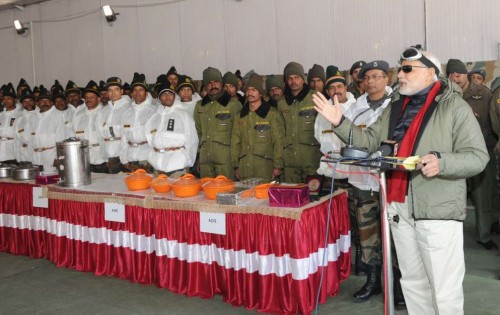
Prime Minister Narendra Modi flew to the icy heights of Siachen Glacier in Jammu and Kashmir wrapped in thick woollens where he lauded the armed forces and promised a national memorial for Indian soldiers.
The Siachen halt marked the start of a visit on Diwali day to the state where he later met victims of the recent floods – the most destructive in 50 years – at the Raj Bhavan, an event boycotted by Chief Minister Omar Abdullah.
“I am fortunate that as a servant of the nation, I got to see in what circumstances the soldiers have to live here,” Modi said, addressing troops in Hindi in freezing temperature at the world’s highest battlefield.
Dressed in battle fatigue woollen jackets, a red scarf and goggles to protect the eyes from blizzards, Modi promised to enforce a one-rank-one-pension scheme for the armed forces during his tenure.
“It is my duty to see that you and your family live in pride.”
The Siachen conflict between India and Pakistan has reportedly claimed more than 2,000 lives on both sides since 1984, with most soldiers falling victim to inhospitable weather and altitude problems.
“Everyone is aware of the extreme conditions at Siachen. Overcoming every challenge our soldiers stand firm, protecting our motherland,” Modi earlier tweeted.
“Be it the altitude or bitter cold, nothing deters our soldiers. They stand there, serving our nation. They make us truly proud.”
He said he had “a message from each and every Indian to our soldiers: that we stand shoulder to shoulder with you…
“We realise how and in what difficult conditions you are deployed here.”
From Siachen, Modi extended Diwali greetings to everyone — including President Pranab Mukherjee, the commander in chief of the armed forces.
“Perhaps this is the first time a prime minister has got the wonderful opportunity of spending time with our jawans on this auspicious day… Am sure this would be among the most unique greetings Pranabda received.”
Every Indian stands “shoulder to shoulder” with soldiers in Siachen, he said.
As Modi flew to Siachen, Pakistan Rangers fired at Indian paramilitary positions on the international border in Jammu region 365 km away while a strike called by separatists hit life in Srinagar.
A police officer told IANS that Pakistan Rangers fired at the Narain border post of the Border Security Force at Ramgar in Samba district. The firing started at 10.30 a.m.
Indian and Pakistani forces have been routinely firing at and shelling each other in recent times.
“We sleep peacefully because you are awake night and day,” Modi said in his speech. He added that all three wings of the armed forces — army, air force and navy — were the nation’s pride.
“This is my first Diwali after becoming the prime minister… I am very happy to be with these bravehearts.”
After underlining that soldiers always helped people during disasters, Modi said he wanted to build a national war memorial for the military.
Meanwhile, buses went off the roads in Srinagar but some private vehicles and autorickshaws plied during a shutdown called by separatist groups that are opposed to Modi’s visit.
Most shops and businesses were shut in Srinagar, the urban hub of a dragging separatist campaign that has claimed thousands of lives in Jammu and Kashmir since 1989.
Police and paramilitary personnel were deployed in visibly large numbers all across Srinagar.
Separatist leader Syed Ali Geelani accused Modi of rubbing “salt on our wounds” by visiting Kashmir on Diwali but not extending Eid greetings to Kashmiri Muslims.
Jammu and Kashmir Liberation Front leader Yasin Malik said Modi was “politicising a human tragedy” — a reference to Modi’s meetings with the flood victims.